Treating Pediatric Asthma with Healthier Homes
See this story on CHOP's website
Pediatric health care providers are increasingly realizing just how closely related health and housing are, particularly when it comes to asthma. Homes that have lots of holes, cracks and leaks – as do many of the old homes in inner city Philadelphia – are more likely to have asthma environmental triggers including mice, cockroaches, mold and dust. These triggers increase asthma symptoms, which can lead to asthma attacks and increased asthma morbidity.
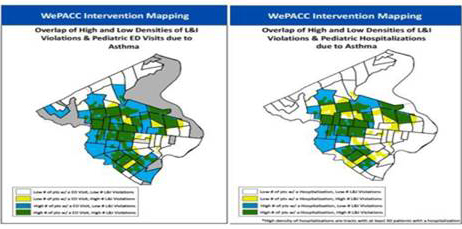
Recently, the West Philadelphia Asthma Care Collaborative, of which PolicyLab is a member, mapped where children lived who were hospitalized for asthma and compared it to licensing and inspections violations (a proxy for substandard housing). What we found was significant overlap; we could almost predict the addresses of children who are hospitalized for asthma based on where they lived.
The reality is that pediatric physicians can provide all of the anti-inflammatory medications on the planet to their patients, but if they are sending them to houses that are not only teaming with asthma triggers but falling apart at the seams, children will continue to suffer, spending more time in the emergency department or in the hospital. This is not only harmful for families, but leads to more health care costs. In 2013, the U.S. spent $81 billion on asthma management. But what if we could proactively use some of those dollars to improve housing to keep children out of the hospital? That was the question that brought us together to work on a project that can directly impact the health and well-being of the approximately 12,250 children living with asthma in the West Philadelphia community.
In August 2017, Children’s Hospital of Philadelphia’s (CHOP) Community Asthma Prevention Program (CAPP), Rebuilding Together Philadelphia, the Philadelphia Department of Public Health and other collaborators* received a $250,000 two-year grant to improve asthma outcomes related to unhealthy housing in targeted West Philadelphia neighborhoods. This collaborative, known as the Home Preservation Initiative for Health Living (HPI), aims to significantly reduce asthma-related emergency department visits and hospitalizations by combining home repairs with CAPP's home visit program that provides asthma education and environmental remediation. Using outcome data, HPI aims to show health care cost savings, ultimately striving to make a strong case for Medicaid reimbursement for home repairs in order to keep kids healthy and out of the hospital.
Last year, HPI was excited to learn that the collaborative could extend our impact through the awarding of the competitive BUILD Health Challenge Award, which was supported by funders including The Kresge Foundation, The Robert Wood Johnson Foundation and The W.K. Kellogg Foundation. BUILD and its communities apply bold, upstream, integrated, local and data-driven (BUILD) approaches to improve health in communities that are adversely affected by factors such as substandard housing conditions and limited resources for home repairs.
CHOP provided an additional $330,000 in cash and in-kind support to BUILD from CAPP and PolicyLab. For the past 20 years, CAPP has provided thousands of home visits in the community resulting in reduced asthma hospitalizations and emergency room visits. In this project, CAPP community health workers identify homeowners who will benefit from home repairs.
Our first family was led by Sarah Bright [name changed to protect identity], who has three boys with asthma, ages 5, 10 and 14. Asthma has been significantly impacting the family’s daily life. For example, Sarah’s oldest child is very active, but often misses his bowling team competitions because of asthma symptoms and related hospital admissions. Sarah’s CAPP community health worker recommended she apply for HPI home repairs. Rebuilding Together Philadelphia, a nonprofit specializing in home repairs to improve residents’ health and safety, accepted Sarah’s application and evaluated her house looking out for specific repairs that would reduce asthma triggers. To do so, they consulted a chart of asthma triggers and the corresponding repairs to reduce those triggers that CAPP and home repair providers collaboratively developed.
Sarah’s repairs included: roof repairs (to prevent mold caused by moisture penetration), carpet removal and vinyl floor install as well as duct cleaning and furnace filter replacement (to remove and prevent dust), a new kitchen exhaust vented to the exterior (to prevent mold caused by poor ventilation and humidity), additional wall cabinets for food storage and professional integrated pest management (to control pests). With these repairs, reduction in dust, mold and cockroaches’ allergens will contribute to better asthma control and reduce risk of hospitalization or emergency department visits.
See below for before and after photos of the repairs:
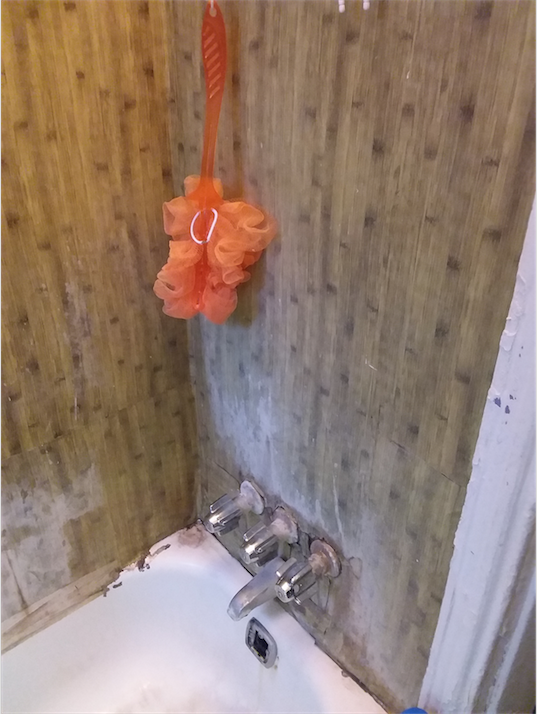
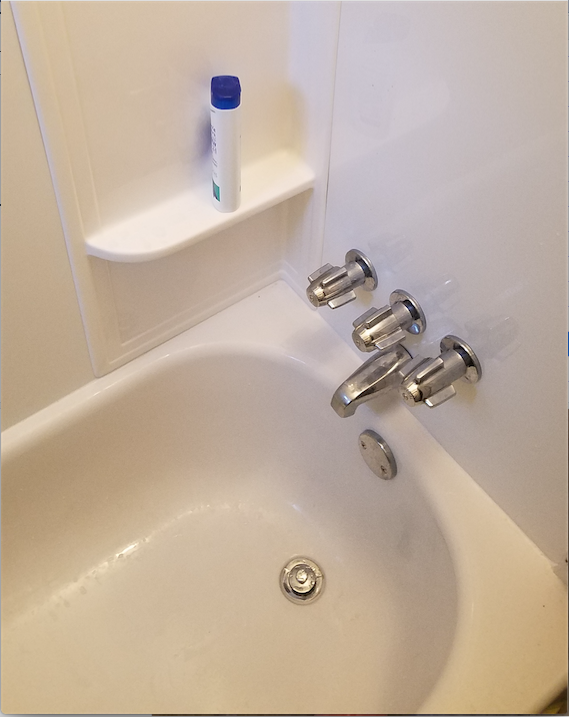
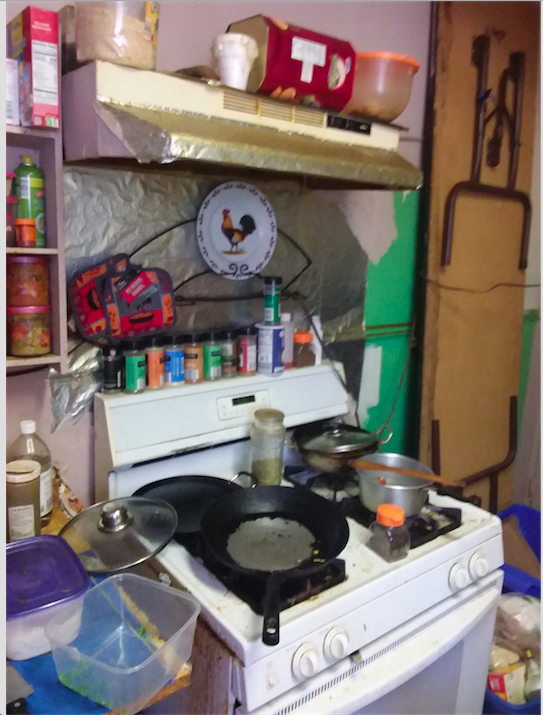
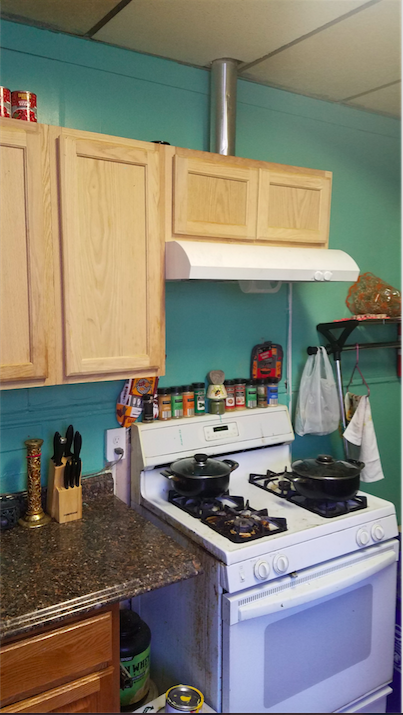
HPI is currently working on eight homes, including Sarah Bright’s, but it wasn’t so easy to get here. Collaborators were initially surprised to find how few homeowners were eligible in the targeted neighborhoods. Most of CAPP’s patients do not own their own homes but instead live in rental housing, which was not a part of the proposed project since Rebuilding Together Philadelphia and collaborator Habitat for Humanity only work with homeowners. This was just one of the challenges the collaborative had to overcome, but we’re proud to say that we’ve found solutions to be able to repair 40 homes by March 2019.
Can home repairs really keep the pediatrician away? Current evidence endorses healthy housing for children with asthma leading to reduction in asthma hospitalizations and costs. In fact, one study showed a cost savings of $800,000 for 170 children over one year. But what makes this collaboration unique and never-tested in Philadelphia is that it combines both home asthma educational/limited environmental remediation visits and major home repairs. CAPP’s home visiting program is already successful at reducing asthma-related admissions. This group of doctors, healthy home repair specialists and community members will find out if adding home repairs can be even more successful in helping families control asthma in West Philadelphia.
*Additional HPI for Healthy Living collaborators are: Drexel’s Dornsife School of Public Health, Habitat for Humanity Philadelphia, Philadelphia LISC, Mt. Vernon Manor CDC, People’s Emergency Center.
Stefanie Seldin, JD, is the executive director of Rebuilding Together Philadelphia. Previously, Stefanie was the managing attorney for Philadelphia VIP, an agency that recruits volunteer attorneys to assist low-income residents facing civil legal problems threatening their basic human needs.
Tyra Bryant-Stephens is a faculty member at PolicyLab at Children’s Hospital of Philadelphia and the medical director of the Community Asthma Prevention program (CAPP). Her research focuses on the use of community-based interventions to improve child asthma outcomes for underserved populations.